Choosing the Perfect Names for Cockatiels
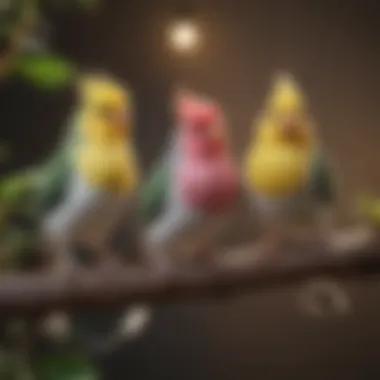

Intro
Choosing a name for your cockatiel is far more than just a matter of personal preference—it’s a pivotal decision that impacts the bond you share with your feathered companion. Cockatiels are not just pets; they become members of the family. Each chirp and flutter is an invitation to build a relationship rooted in understanding and affection. Thus, the right name is not only a label but a bridge that enhances communication between you and your avian friend.
In this guide, we will venture through various aspects of naming your cockatiel. From cultural influences and themes to the significance of personal touches, we’ll cover a spectrum of inspirations that can help land on that one perfect name. Whether you are welcoming your first cockatiel or adding to an already bustling aviary, this comprehensive guide will equip you with the insights and suggestions you need.
Understanding the essence of a name can greatly enhance the experience of having a pet bird, fostering a strong connection that benefits both you and the cockatiel. This narrative will weave through the importance of names and how they can shape the daily interactions, moods, and even training of your bird.
So, without further ado, let's delve into the considerations involved in choosing an ideal name for your cockatiel and the myriad ways it can reinforce the special partnership between you and your charming little pal.
Understanding Cockatiel Behavior
When it comes to cockatiels, understanding their behavior is paramount. These birds, known for their social nature and lively personalities, are not just pets but companions that thrive on interaction. Grasping their behavioral patterns can significantly enhance the relationship between the bird and its owner. In this article, we will discuss the social dynamics of cockatiels and the effects of name recognition in their interactions.
Social Dynamics of Cockatiels
Cockatiels are social creatures by nature. They thrive in environments where they can engage with their human caretakers or other birds. This social aspect plays a crucial role in ensuring a happy and healthy pet. When a cockatiel feels part of a social group, they tend to exhibit more positive behaviors, such as singing, whistling, and even mimicking sounds.
Here are some key points to consider about the social dynamics of cockatiels:
- Flock mentality: Cockatiels often live in flocks in the wild. Therefore, it is essential to recognize their need for companionship. Keeping more than one cockatiel can replicate this natural environment, leading to happier and well-adjusted birds.
- Bonding: Creating strong bonds with your cockatiel is crucial. This can be achieved through daily interaction, including talking, playing, and even simple activities like grooming. These moments help build trust, making it easier for the bird to feel secure around you.
- Body language: Cockatiels communicate a lot through their body language. A puffed-up bird might be feeling relaxed and content, while rapid tail movements could indicate excitement or stress. Observing and understanding these cues will help you cater to your cockatiel’s emotional needs.
Effects of Name Recognition
Names play a pivotal role in the communication process between a cockatiel and its owner. The right name can facilitate interaction and help reinforce a sense of identity for your feathered friend. When a bird recognizes its name, it shows an increased willingness to engage with its owner, leading to a more fulfilling relationship.
Here are some observations on the effects of name recognition among cockatiels:
- Response to Calls: Cockatiels can learn to associate their names with attention or treats. When a bird hears its name being called, it may respond by coming over or making sounds. This builds a sense of belonging and involvement in the household.
- Positive Reinforcement: Using a bird’s name in positive situations enhances recognition. For example, calling your cockatiel when it performs a trick or comes to you during playtime can reinforce that the name is linked with good experiences.
- Personality Development: Names can also reflect the bird's personality traits. A cockatiel named "Chirpy" may embody a vibrant and chatty nature while a name like "Nibbles" could suit a more inquisitive, playful bird. This connection can deepen the owner-bird bond and provide insights into the welfare of the pet.
Understanding how your cockatiel’s behavior relates to their name can foster stronger interactions and enhance your bond significantly.
The Significance of Naming
Naming a cockatiel is more than just picking a cute label; it plays a crucial role in shaping the relationship between the bird and its owner. A name acts as a tool for communication and connection, forming the backbone of daily interactions. When a bird hears its name, it often becomes more alert and engaged, responding to its owner, which in turn fosters a sense of trust.
Similarly, names hold deep personal significance for pet owners. They reflect the owner's personality, preferences, and emotions. A well-chosen name can encapsulate the essence of very bird, adding layers to the bond. The process of naming creates an opportunity for owners to invest emotionally in their feathered companions.
Establishing Bond and Trust
When you choose a name for your cockatiel, you lay the groundwork for the relationship. The act of calling your bird by its name can become a ritual that enhances familiarity and comfort for both parties involved. Each time you use the name, it creates a thread connecting you and your pet. This connection is vital because it can help your bird feel secure in its environment.
A cockatiel is not just a bird; it's an entity that can recognize its name, responding with chirps or movements, a confirmation that they are tuned into the world created around them. The trust built through naming allows an owner to develop a rapport with their pet over time. Words of affection and commands become part of a language you both understand, ultimately strengthening that bond.
Identity and Individuality
Beyond mere utility, a name bestows identity upon the cockatiel. Unlike generic titles, a unique name can highlight the individual personality traits of each bird. For example, a lively cockatiel might suit a name like "Zippy," reflecting its energetic nature, while a more laid-back one might resonate with "Chill." Names can even hint at their physical attributes—"Snowy" for a white-feathered bird or "Ginger" for one adorned in rust.
Through naming, an owner provides their pet with a sense of personal identity. A bird that feels special and seen often exhibits more settled behavior, showcasing confidence that stems from knowing its place within the family unit. Moreover, unique names can spark conversations and connections with other bird enthusiasts, enriching the experience of being a cockatiel owner.
"Naming a pet creates a bond that goes beyond love; it's a commitment to understanding and nurturing a unique personality."
Ultimately, the importance of naming extends well past the bird itself, echoing within the lives of their owners as they derive joy and companionship from this wise little domestic creature.
Cultural Inspirations for Names
The journey of finding the perfect name for your cockatiel often goes beyond personal preference. It can be an enriching experience that draws upon diverse cultural influences. The selection process allows pet owners to connect with their bird on a much deeper level, reflecting not only the animal's unique features but also an appreciation for heritage and individuality. By tapping into cultural inspirations for names, one can enhance the bond shared with their feathered friend and make the naming process even more meaningful.
Names from Mythology
When considering names derived from mythology, one ventures into a treasure trove of stories and characters that have stood the test of time. Names like Apollo, the Greek god associated with music and light, could be perfect for a cockatiel known for its melodic calls or vibrant plumage. Similarly, Athena, the goddess of wisdom, might suit a particularly intelligent or curious bird. Mythological names often carry a sense of history and gravitas, providing a narrative backdrop to the chosen name.
Moreover, incorporating a mythological reference adds a layer of prestige. Owning a cockatiel named after a legendary figure can spark conversations with friends and fellow bird enthusiasts.
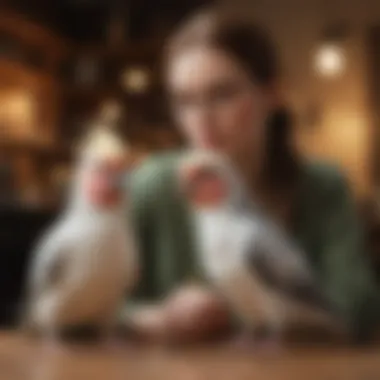

Consider the following examples from various cultures:
- Ra: The Egyptian sun god, representing light and warmth.
- Freya: The Norse goddess of fertility and love, ideal for a nurturing bird personality.
- Loki: A trickster figure known for its playful nature, fitting for a mischievous cockatiel.
Names Inspired by Nature
Nature offers endless possibilities for naming your cockatiel. Much like the variety available in the avian world, names inspired by the elements can reflect the unique characteristics of your pet. Whether it’s the vibrant hues of feathers or the personality traits associated with natural phenomena, nature-based names often resonate deeply.
Names like Willow, evoking images of grace and beauty, could suit a gentle bird with a calm demeanor. Cedar may fit a cockatiel with earthy tones or a sturdy personality, while Sky reflects an openness and freedom that many bird owners admire in their pets.
Some other nature-inspired names include:
- River: Reflecting a lively spirit and fluid motion.
- Sage: A name referencing both wisdom and a lovely herb, suitable for a mellow bird.
- Echo: A whimsical name, especially for a cockatiel that loves to mimic sounds.
"Nature is not a place to visit. It is home." – Gary Snyder
Choosing names from mythology or nature not only enriches the identity of your cockatiel but also allows owners to express their connection to the environment or their cultural interests. Each chosen name can be a conversation starter and a reflection of the owner’s appreciation of both the bird and the world around them.
Thematic Naming Considerations
When it comes to naming your cockatiel, the theme behind the name can carry substantial weight. Thematic naming considerations allow bird owners to connect with their feathered friends on various levels. Drawing from color and personality traits serves not just as a practical approach but also as a creative outlet. It adds richness to the relationship between pet and owner. The right name reflects not merely the bird's appearance or demeanor, but also the owner’s affection and understanding of their pet's character. A name helps set the tone for interactions, and it's important that it resonates on both ends—feathered and human.
Color-Based Names
Color-based names provide a tangible link between a cockatiel’s appearance and its identity. Many bird owners might find themselves inspired by the vibrant feathers that grace their pets. From the sunny yellows of lutino cockatiels to the striking grey of the pied variety, naming based on color can be a rewarding experience.
Some potential names include:
- Sunny for a bird with bright yellow hues, reminiscent of a sunny day.
- Shadow could suit a darker-colored cockatiel, reflecting its shades and perhaps a bit of its mysterious side.
- Emerald would be fitting for a bird with green tints, drawing inspiration from nature's rich palette.
- Cocoa can embody the warm brown tones of certain cockatiels, invoking comfort and sweetness.
By choosing a name that mirrors the bird's feathers, owners often feel a deeper sense of connection. This method fuels creativity while allowing the cockatiel's individuality to shine. Such names resonate with the owner’s affection and, undeniably, with the vibrant personality of the cockatiel.
Names Based on Personality Traits
Delving into personality is another powerful approach to naming a cockatiel. Every bird has its quirks—whether they are playful, shy, or sassy—these traits can inspire names that truly reflect who they are. A name based on character could enhance the bond between bird and owner.
For instance, you might consider:
- Chirpy for a chatty and affable bird that fills your space with sounds.
- Bubbles for one that is perpetually playful and full of energy.
- Nibbles for the bird that loves to gently bite and play with everything it can grab.
- Zara fitting for a cockatiel with a strong-willed personality.
When owners select names based on traits, it also benefits the birds. A name connected to their behavior can serve as a form of communication, signaling to the bird what is expected and fostering a clearer understanding. The authentic representation of a bird’s personality fosters a deep-seated connection, enriching both their lives tremendously.
"Choosing a name that resonates with a bird's character can be as rewarding as watching them flourish in their unique way."
In summary, thematic considerations in naming not only highlight the distinctive characteristics of cockatiels but also transform the naming process into a meaningful journey. Regarding cockatiel names, both color and personality serve as rich sources of inspiration.
By integrating these themes into naming practices, owners can enhance their connection with their feathered companions and create a bond built on understanding and mutual recognition.
Top Names for Cockatiels
Choosing a name for your cockatiel is not just a casual whim; it can significantly affect the bond you form. A well-chosen name has a way of resonating with the bird's personality, making it easier for the cockatiel to relate to its owner. As a potential pet parent, knowing the top names among owners can lend insight into popular trends and characteristics these names evoke. Moreover, considering the unique and creative options available can bring a refreshing perspective to the naming process, making it even more meaningful.
Popular Names Among Owners
When it comes to top names, there are favorites that numerous owners gravitate towards. This often stems from cultural references, personal experiences, or even just the sounds a name makes. Here are some of the most beloved choices among cockatiel owners:
- Sunny: Radiating joy and brightness, this name often attracts owners who want a vibrant companion.
- Pepper: A catchy name that suits birds with spunk and personality—ideal for those little feisty cockatiels.
- Coco: This name is sweet like the cocoa bean, making it perfect for those birds with warm and comforting feathers.
- Mango: Evocative of tropical vibes, it mirrors the fun and zest cockatiels bring into the home.
Many pet owners often select names based on their cockatiel's color or temperament, blending personal preferences with the bird's attributes. Getting involved in communities like Reddit can help you see which names are making waves. Not only is this a fun exploration, but it also connects you with fellow cockatiel enthusiasts.
Unique and Creative Options
For those who seek names beyond the mainstream, thinking more outside the box can lead to some truly unique discoveries. Here’s where personal stories, literary inspirations, or even everyday life can play a key role. Some unconventional ideas include:
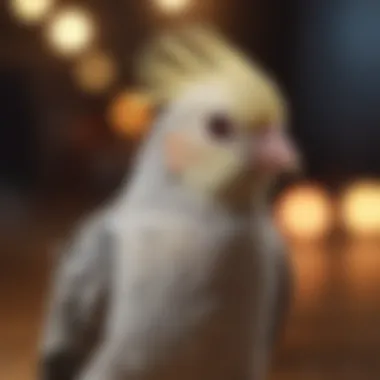
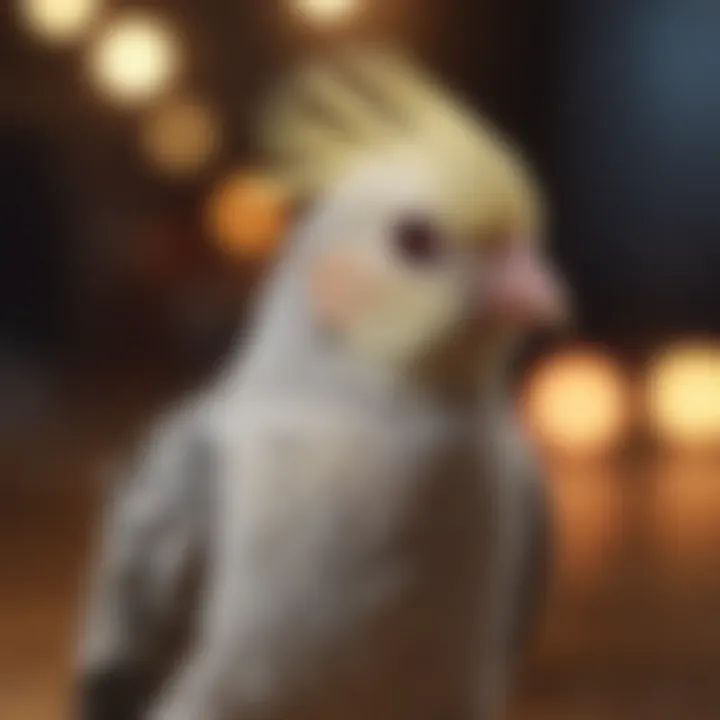
- Nimbus: Perfect for fluffy gray cockatiels, reminiscent of soft, fluffy clouds.
- Quasar: A nod to astronomy, ideal for those wanting a cosmic connection with their pet.
- Tango: For a bird that moves with grace and rhythm, this name adds a lively flair.
- Alfred: A dignified name, great for a cockatiel that displays a regal air.
Flipping through your favorite book or TV show can yield a goldmine of inspiration. Character names that resonate with you can perfectly reflect the essence of your feathered companion. After all, naming is an art form, and like any good piece of art, it reflects the creator's personality. Don't hesitate to mix and match ideas or come up with entirely new names that capture the spirit of your unique cockatiel.
"A name is not just a word; it’s a window into understanding the bond between you and your bird."
Naming a cockatiel is a delightful journey. Whether you opt for something beloved by many or venture into more creative territories, the most vital part is what the name signifies to you and your bird. Consider these popular names and unique options as starting points that can guide you to the name that best fits your new friend.
Influence of Bird’s Appearance on Naming
When it comes to naming cockatiels, one might think the choice is mostly about personal preference or whimsy. However, the bird's appearance wields significant influence over what name fits best. This connection between a cockatiel's looks and its name can help in fostering deeper recognition and bonds between the bird and its owner.
It's not just about aesthetics; understanding those physical traits can open a world of imaginative possibilities. Capturing a cockatiel's essence through its naming can add layers to the relationship.
Physical Characteristics as Inspiration
The physical attributes of a cockatiel, such as its size, feather patterns, and even distinct quirks, are often the first things that catch an owner's attention. These features can serve as ideas that guide the naming process.
For instance, a cockatiel with striking yellow and grey plumage might inspire names like "Sunny," evoking the brightness of the sun. If your feathered friend has a plump little body, names like "Chubbs" may resonate well. It's these little aspects, unique to each bird, that can help in creating a name that feels just right.
Here are some ways to tap into your cockatiel's physical characteristics for inspiration:
- Color: Observe the main colors present in your bird's feathers. Names such as "Cocoa" or "Ivory" can reflect their hues.
- Size and Shape: If your cockatiel is smaller than average, a name like "Peanut" can highlight its diminutive stature.
- Distinct Features: Any unique markings or characteristics, like a crooked beak or a fluffy crest, can suggest names like "Whiskers" or "Fluffball".
The purpose of naming based on these traits goes beyond mere vanity; it establishes a deeper connection between the owner and pet by recognizing and celebrating individuality.
Variations in Color and Their Significance
The color variations among cockatiels also play a pivotal role in their naming. In the avian world, colors aren't just skin deep – they often carry meanings and attributes, influencing the type of name that seems fitting.
Cockatiels come in a variety of colors, from the classics, like grey and yellow, to more vibrant options like lutino – a striking all-yellow variation. This rich palette can lead to diverse naming choices, often reflecting personality, mood, and even the bonds formed.
Some important points regarding how color variations might shape naming include:
- Symbolic Meanings: Each color often has meanings. For instance, grey might evoke feelings of calmness and wisdom, suggesting names like "Gandalf" or "Zen."
- Personality Reflection: A particularly vibrant yellow bird may exhibit outgoing, playful behavior, lending itself to energetic names like "Zest" or "Spark."
- Cultural Associations: In various cultures, colors can carry specific connotations. In some traditions, a predominantly white cockatiel could be named "Kumo," which translates to "cloud" in Japanese, reflecting its light hue and serene presence.
In essence, letting your cockatiel's appearance guide your naming decision can deepen your understanding of your pet while enhancing the bond you share.
Remember, the name you choose will not only resonate with your bird but also enrich the overall relationship you cultivate together.
In the end, whether it's a name inspired by color or a reflection of physical traits, the goal is to find something that both the owner and bird can embrace, forging a lasting connection.
Personal Name Inspirations
When it comes to naming your cockatiel, personal name inspirations carry significant weight. These inspirations form a bridge between the owner and the bird, enriching the bond through shared meaning. Whether directly through the names of beloved characters or family signatures, the connections created impact the relationship on a deeper level. Often, a name drawn from personal experiences evokes cherished memories and emotions, making the naming process a reflection of one’s identity.
Drawing from Favorite Characters
One of the most delightful ways to name a cockatiel is to draw from favorite characters in books, movies, or TV shows. Characters resonate with us for various reasons; they may embody traits we admire or spark nostalgic sentiments. Consider names like Gizmo for a quirky bird, inspired by the charming creature from "Gremlins," or Leia for a regal and strong feathered friend, referencing the iconic Princess from "Star Wars."
Names from characters serve not just to identify your cockatiel but also to share a story. If you have a penchant for Sherlock Holmes, naming your bird Watson or Holmes can create a whimsical conversation starter for visitors. Likewise, for fans of classic literature, opting for names like Poe or Austen could signify your admiration for those authors, making it clear your cockatiel is a beloved companion rather than just a pet.
"A name from a character can make your bond even stronger, as it reflects your interests and passions."
In this way, the name resonates personally and creates a unique identity for your cockatiel, one that mirrors a part of you.
Family Influence and Heritage
Family influence also holds considerable sway in the naming process. Drawing names from relatives or using names that reflect cultural heritage can deepen the significance. A cockatiel named Nana can honor a beloved grandmother, instantly tugging at heartstrings whenever the name is called. Similarly, names that carry the legacy of family traditions can foster a renewed sense of connection.
Some owners may opt for names that reflect their ethnic background or cultural story. For instance, an Italian bird owner might lean towards the name Giovanni, while a German owner could choose Liesel. These names often come with rich histories and meanings, adding another layer to the owner's affection for their cockatiel.
A family-based name doesn't have to come from direct lineage either. It can encompass family history, traditions, or regional heritage, celebrating the values passed down through generations. An owner could like to name their bird after a favorite family vacation spot or after a memorable family pet.
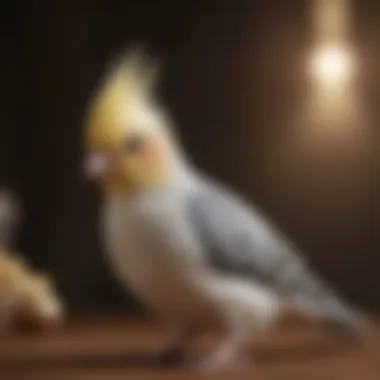
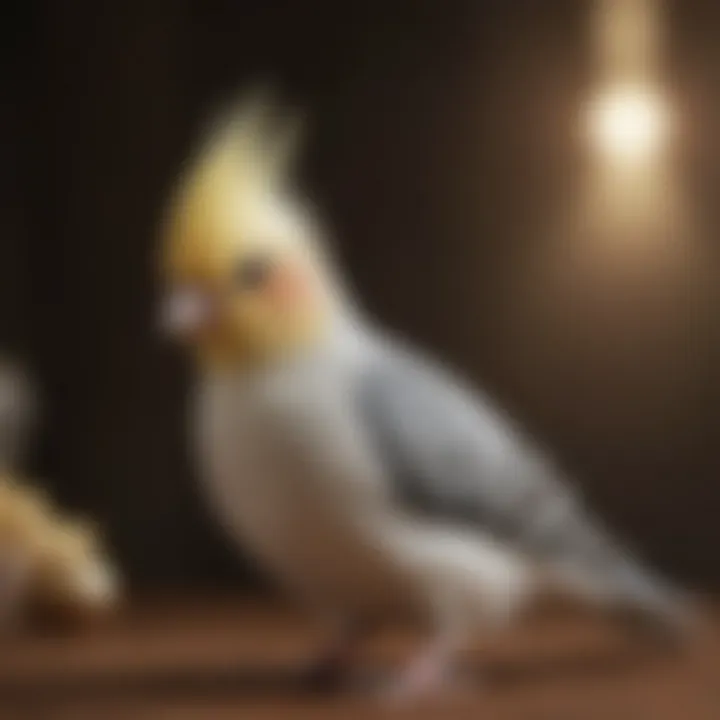
In summary, when considering what to call your cockatiel, think personally. Drawing from favorite characters not only aligns the bird's identity with your interests but also allows for a tailored naming experience. Likewise, reflecting on family and heritage enriches that name, creating a lineage of love, nostalgia, and significance shared with your feathery companion.
Practical Tips for Choosing a Name
Choosing the perfect name for your cockatiel is more than just a fun task; it plays a pivotal role in establishing communication and building a relationship with your feathered friend. The significance of a name goes beyond mere identification. It can impact how your bird reacts to you and the environment around it. A name that resonates well can foster a sense of connection, trust, and understanding, helping you create a stronger bond with your pet.
When you embark on the naming journey, keep in mind that a good name should be an extension of your bird's personality and your lifestyle. Here are some practical pointers to guide you through the naming process.
Simplicity and Pronunciation
Choosing a simple name is vital when it comes to ensuring clear communication. Cockatiels, while intelligent, can sometimes have difficulty with complex or lengthy names. Opting for a name that's easy to pronounce allows your cockatiel to recognize it more quickly.
Consider names with one or two syllables. They not only roll off the tongue more easily but are also more likely to stick in your bird's memory. Names like "Pip," "Luna," or "Ziggy" can be great examples. Furthermore, here are some additional tips to consider:
- Avoid complex sounds: Names with harsh consonants or multiple syllables might confuse your bird.
- Test it out: Say the name out loud several times to see how it feels. Does it sound pleasant? Is it easy to say quickly?
- Call your bird: Experiment with the name while interacting with your cockatiel. If they respond positively, you may be onto something special.
Avoiding Confusing Sounds
Birds are perceptive creatures, and they often rely on auditory signals for recognition and communication. When selecting a name, it’s crucial to ensure that it doesn’t acoustically clash with other everyday sounds or commands. A name that sounds too much like a command could lead to confusion.
For example, if you name your cockatiel "Kit"—a name close to "Sit"—your bird might struggle to differentiate between its name and the command. This can lead to unwanted misunderstandings and potential frustration for both parties.
To avoid this kind of mix-up, consider these strategies:
- Steer clear of common commands: Evaluate common words you use around your bird. Names like "Go" or "Stop" may create issues.
- Create a list: Make a list of potential names and say them out loud beside basic commands. This simple exercise can help you discern any auditory similarities.
- Seek feedback: If you're unsure, don’t hesitate to ask fellow bird owners or enthusiasts for their opinions on your chosen names. They might offer valuable insights.
The name you choose can shape the interaction you have with your cockatiel. A thoughtful approach to naming can enhance your relationship, ensuring that communication is as smooth as possible.
Changing Names: When and How
Choosing the right name for a cockatiel is more than just a formality; it is, in a way, an initiation of the bond between pet and owner. Over time, circumstances may arise that necessitate changing a bird's name. This section sheds light on when and how to change a cockatiel’s name, taking into account emotional factors, the bird’s recognition ability, and the importance of a smooth transition.
Signs That a Name Isn't Working
Not every name you select feels like it fits comfortably. There can be cues that signal a name isn't resonating with your feathered friend. Here are some tell-tale signs:
- Lack of Response: If your cockatiel doesn’t react when you call its name, it might mean the name isn't fitting.
- Nervous Behavior: If you notice your bird becoming agitated or stressed when called by a specific name, it's definitely time to reconsider.
- Inconsistency: Sometimes, you might feel uncomfortable or unnatural when using the name. A lack of enthusiasm might filter through to your cockatiel.
- Association with Negative Experiences: If the bird has had a bad experience while being called by its name, it can develop a negative association with it.
Recognizing these signs can lead to a more harmonious relationship, paving the way for a name change.
Strategies for Transitioning to a New Name
Transitioning to a new name can sound more daunting than it actually is. Here are some strategies to consider that may ease the process:
- Introduce Gradually: Start by introducing the new name along with the old one. Use phrases like "[old name]…now [new name]" to build a bridge between the two names.
- Positive Reinforcement: Use treats or favorite toys when calling your cockatiel by its new name. Associating the name with positive experiences will help make the transition smoother.
- Short and Sweet: Choose a name that is easy to say and distinct from other words in your household environment. A simple name can reduce confusion for the bird.
- Consistency is Key: Be persistent. Call your cockatiel by its new name consistently. Over time, the bird will start recognizing it more readily.
"A name is the first thing that paints a portrait of who you are – for you and your pet. Changing it can open new doors."
Keeping these points in mind will not only help with choosing a new name, but can also enrich the connection with your cockatiel.
Changing a bird’s name takes care, thought, and the right approach. Emphasizing a gradual transition with lots of positive interactions minimizes the stress on both the pet and the owner. If done carefully, this step can strengthen the bond and lead to a more joyful companionship.
Culmination: The Power of a Name
When it comes to naming your cockatiel, the importance of the process cannot be overstated. A name holds weight—it’s a significant part of a bird’s identity and plays a crucial role in the bond you share. How you choose that name can be influenced by various factors, from personal connections to cultural inspirations. Consideration of these aspects can make the naming journey as meaningful as the relationship itself.
Reflecting on the Naming Process
Reflecting on how you settled on your cockatiel’s name might lead you down a rich path of memories and emotions. Perhaps you named your feathered friend after a character from a beloved book, or maybe you opted for a name that reflects their unique personality traits—joyful, mischievous, or even shy. Your choice is not just a label but an important act that signifies a connection. The act of naming often leads to a deeper understanding of their quirks and behaviors, creating a tapestry of interactions that enrich both of your lives.
Finding the right name can involve a bit of trial and error, as interactions with your cockatiel often reveal what names resonate best. It’s common for owners to toy with a few different names until one truly sticks. This process of trial generates a sense of anticipation��—watching to see which name draws their attention and captures their spirit. Indeed, it’s not always about instinctively knowing the perfect name right away.
Long-term Impact on the Owner-Bird Relationship
A well-chosen name can lay the groundwork for a thriving relationship between you and your cockatiel. It’s not just about saying words; it's about the emotion and affection that’s wrapped up in that name. When you call your bird by name, you're doing so not only with affection but also with a recognition that nurtures trust and understanding.
As time passes, the name you’ve chosen may become a special bond that ties your experiences together. Cockatiels, known for their intelligence and sociability, can respond to their names in ways that remind you of your bond. Over the years, as their personality evolves, the name retains its significance even amidst changes in behavior or preferences.
In essence, the name you give your cockatiel isn’t static; it’s a living part of your shared journey, a reflection of the memories created together. This relationship—deeply rooted in the name chosen—can enhance the joy of bird ownership and help in understanding one another better. Throughout the ups and downs, that name serves as an emblem of companionship and affection, enriching every moment together.















